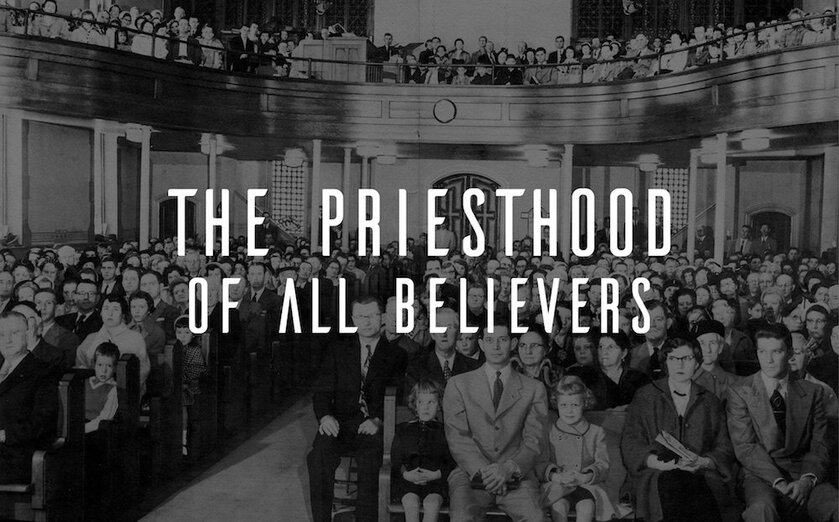From Cultural Ritual to Living Faith: How God’s Prevenient Grace Transformed My Infant Baptism into Galatians 2:20
Galatians 2:20
"I have been crucified with Christ. It is no longer I who live, but Christ who lives in me. And the life I now live in the flesh I live by faith in the Son of God, who loved me and gave himself for me."
What might my faith journey have looked like if my family had been part of a community that modeled a sincere love for God?
In many historically Christian countries, and in my own world, infant baptism is common, but some individuals later drift from or reject Christianity in adulthood. Studies (e.g., Pew Research, 2020) show that in Europe, a significant portion of the population is baptized but identifies as non-religious or follows other beliefs. In places like Sweden or the UK, where secularization is advanced (Pew Research, 2020, notes that 60% of Swedes and 50% of Brits identify as non-religious despite high rates of infant baptism). This is likely the result of pragmatism. In many cultures, baptism is a social or familial tradition rather than a deeply held religious commitment. Parents may baptize their children to maintain cultural ties, please relatives, or ensure social acceptance in a historically Christian community, without expecting lifelong adherence to Christianity. This was certainly the case in my infant baptism. My own infant baptism fits this pattern; a pragmatic choice by my family, likely rooted in cultural or social expectations rather than an insistence on a lifelong Christian devotion.
Do I wish they had been more pragmatic about living the faith and growing me up in a community of faith that has a sincere love for God?
Yes.
Would I trade that over the pragmatic infant baptism?
I think if I had I'd probably not have the faith I have today, though I can't say that for sure. So, I am unsure...in fact today I want to explore that some more.
In our increasingly secular and pluralistic society, many have drifted from their Christian faith due to practical choices; prioritizing career, personal beliefs, or other ideologies over religious identity. And this is showing up in our families and how they view their faith as a community of believers.
Pragmatism can also explain why some embrace Christian beliefs without baptism. For some, baptism might seem unnecessary if their faith is personal or their community doesn’t emphasize it. In fact, when was the last time you saw or heard a church address the subject of baptism in any meaningful sense.
Fact of the matter is that many believers are not baptized or have only ever been "Christened" as a newborn child. Some, as adults, have professed their faith publicly and reaffirmed their infant baptism with anointing. This is my situation.
On The Believers Baptism
A person who is a Christian in their faith but who has not been baptized, not infant baptism but the believer's baptism, tends to fall into these categories:
1. Ignorance - Perhaps not taught about baptism or they've wrongly interpreted the need.
2. Pride - They're not willing to humble themselves. And the longer they resist the harder it gets.
3. Indifference - It's not a priority.
4. Defiance - Sinners in rebellion against Gods will.
5. Unregenerate - Not converted at all. Masquerading in the church as a Christian but not really repentant or living in Christ.
And so, if I had to place myself in one of these categories I'd say I fall, or had been at one time, in category number one. So, if I'm imaging myself growing up in a community with a sincere love for God, I would likely have been immersed in regular practices; church services, prayer, Bible study, and communal acts of service. These could have shaped my worldview from a young age, making that faith a natural part of my identity rather than a cultural footnote like my infant baptism. But along with that cultural identity would have come the culture itself. And that is all too often reflective of the sociology of that particular Christian group. And we see this in stark and unexpected fashion today as secularism and progressive politics have overtaken most church groups to some degree or another.
So, would I have become a better version of Christian faith today were I raised in a church community?
I suppose the answer truly depends upon how one feels about what the cause and effect is in regard to regeneration in Christ. Is that conversion a product of community or something more personal?
What is the believer's baptism?
It is a service in which a person is immersed or dipped into water. And it is always a person who is confessing faith in Christ as they are transliterated in water. Not splashed or sprinkled. This definition reflects the practice of a believer’s baptism, where baptism is a conscious, public act of faith, typically performed on adults or older children who can profess their belief in Jesus Christ.
Biblical Roots:
Acts 2:38
Romans 6:3-4
Matthew 28:19-20
I believe this is clear and true. And I can't find fault in its clarity. But I can ask whether or not it is imperative that it be buried beneath the water's surface verses the pouring of the waters over a person. Especially in light of the reality that this service is purely a symbolic act. God teaches many spiritual truths through symbolism. These symbols carry spiritual meanings and are teaching aids that help us understand the works of regeneration that is God's work alone. So, what is necessary, being dipped below the water's surface, or understanding God's regeneration?
Which is more significant, going under water signifying burial with Christ, or rising out and reflecting regeneration, living a new life empowered by God?
Going under water:
Represents burial with Christ, signifying the believer’s death to sin and identification with Jesus’ crucifixion and burial. It’s a moment of surrender, marking the end of the old self.
Rising out of water:
Reflects regeneration, symbolizing resurrection with Christ and the start of a new life empowered by God. It points to the transformative work of the Holy Spirit, enabling the believer to "walk in newness of life."
How many have fulfilled the first and not endured till the end in the second?
Theologically speaking, this touches on issues of salvation, perseverance, and the role of baptism as a symbol versus the reality of an enduring faith. Practically speaking, it resonates with my observations about secular drift. I'm thinking now about The Parable of the Sower (Matthew 13:20-22): Some receive the word with joy (like going under in faith ceremonially) but fall away due to tribulation, persecution, or worldly cares, failing to endure in the new life. So, from where does regeneration and endurance derive its strength?
Regeneration: The transformative work of God, making a person "born again" through the Holy Spirit (John 3:3-8, Titus 3:5). It's an initial act of spiritual renewal, where God imparts new life, enabling the believer to trust in Christ and turn from sin. It's God's work.
Endurance: The ongoing perseverance in faith, living out the "newness of life" (Romans 6:4) despite trials, temptations, and secular pressures. It’s the sustained commitment to walk with Christ "to the end" (Matthew 24:13).
Scripture is clear about this, it is God's work, God’s grace, through the work of the Holy Spirit, rooted in Christ’s redemptive work, and sustained by faith.
Ephesians 2:8-9
Titus 3:5
Philippians 1:6
For regeneration, grace awakens the heart to faith; for endurance, grace empowers perseverance. It is God doing these things. It is His divine initiative over our human effort.
The agent for this work of grace is The Holy Spirit.
John 3:5-8
Romans 8:11
Galatians 5:22-23
The Holy Spirit is the active agent of God’s grace, effecting regeneration, and providing strength for endurance.
Regeneration "through faith" (Ephesians 2:8), is the human response to God's grace. Without faith it is impossible to please God (Hebrews 11:6). And that faith fuels perseverance (2 Timothy 4:7).
So, what have I learned today in regard to my pragmatic infant baptism?
It didn’t reflect a personal faith or the full symbolism of burial and resurrection. It left me in "ignorance" about the believer’s baptism. Therefore, regeneration and endurance, came later, through a personal conviction and sudden conversion rather than through early community support.
My adult reaffirmation with anointing shows I've embraced regeneration through faith and the baptism of the Holy Spirit. In union with Jesus Christ. Dead to sin but alive to God in Christ Jesus.
Galatians 2:20
"I have been crucified with Christ. It is no longer I who live, but Christ who lives in me. And the life I now live in the flesh I live by faith in the Son of God, who loved me and gave himself for me."
No water, just the baptism that saves. Immersion into Christ, which is ceremonially depicted in water baptism. Therefore, immersion is important but not a saving ceremony. There is no saving virtue in H2O.
Repent and be baptized BECAUSE of the remission of sin. It's about the blessing of obedience in the true confession of Christ openly.
So why does this get so muddied up (pun intended) between the many Christian believers and communities?
Short answer: Satan.
The Devil is forever trying to stir up the mud and make our confessions of faith dim or even better empty and meaningless. Just look around, today churches rarely teach on baptism meaningfully (Barna 2021, only 30% of U.S. Protestant pastors do so). In my case conversion shows that God’s grace was sufficient, despite the lack of early support, this affirms in my mind that the "baptism that saves" is spiritual union with Christ, not water.
My reaffirmation with anointing has embraced the spiritual reality of Galatians 2:20. A willing and public confession of faith. With God's prevenient blessing I've overcome the ignorance of my infant baptism, aligning with the "baptism that saves" through faith and the Spirit. God’s prevenient blessing, His initiating grace, was the force that overcame my "ignorance".
As a side note though, some would argue that my infant baptism "marked" me for regeneration by God's grace. As a sacrament, as a means of grace, a divine blessing. In that tradition, infant baptism is seen as imparting regenerating grace, removing original sin and incorporating the child into the body of Christ (the Holy Catholic Church). It’s an act of God’s prevenient grace, meaning God’s initiating grace before a human response, thereby "marking" the child for salvation and beginning their covenant relationship with God. Like it or not, now you're on God's radar. It's seen as a gateway, or a seal initiating God’s work in the child. It doesn’t guarantee regeneration but signifies God’s promise to work in the child’s life.
I suppose in my case you could say that this did in fact come to fruition.
At the end of the day, I suppose you could also say that I've embraced Galatians 2:20 as the cornerstone of my faith. Regardless of what others have done, what the faith communities are doing or not doing, my journey in Christ probably did begin at my infant baptism in one degree or another. And I thank God for His prevenient grace going forward, because Lord knows I needed it.




















